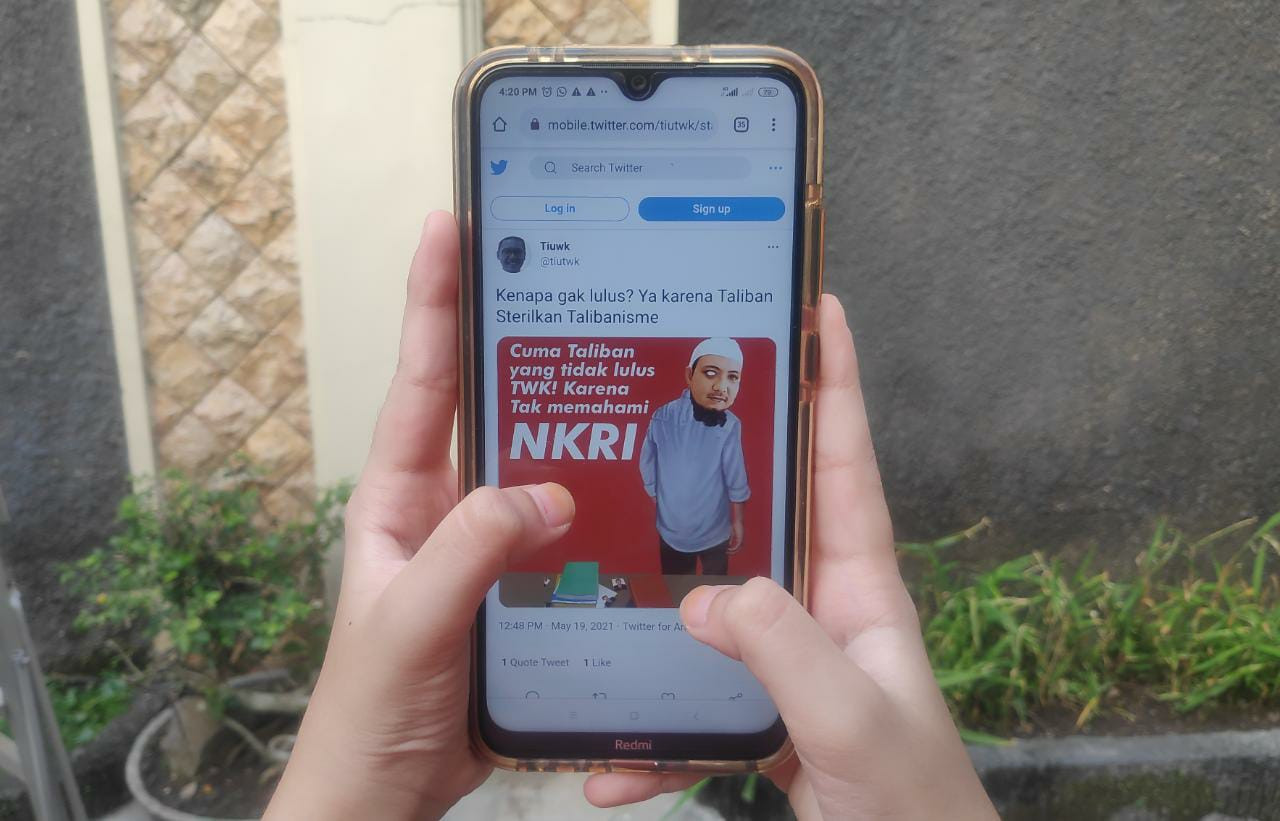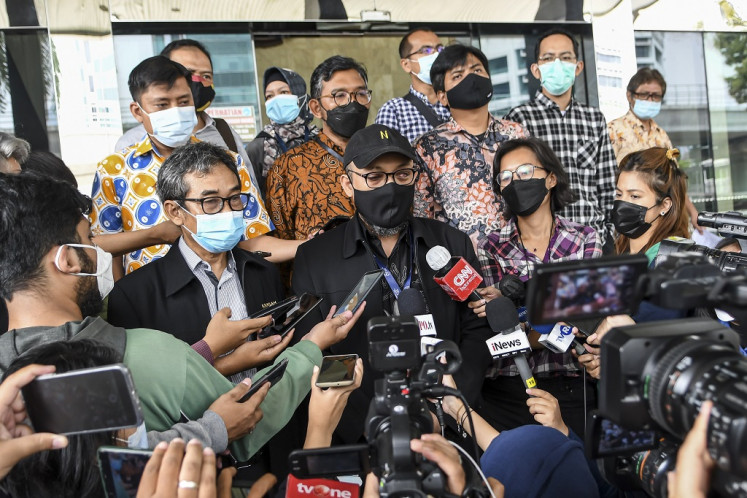Popular Reads
Top Results
Can't find what you're looking for?
View all search resultsPopular Reads
Top Results
Can't find what you're looking for?
View all search resultsCommentary: Bigger threat than ITE Law? Political ‘buzzers’ crowding our cyberspace
Political buzzers work like a virus that replicates the democratic DNA within the online community, but only to subvert its potential.
Change text size
Gift Premium Articles
to Anyone
 A social media user in Jember, East Java, looks at online propaganda on Twitter on Sunday describing Corruption Eradication Commission (KPK) investigator Novel Baswedan as "Taliban" in reference to an Islamist armed insurgence in Afghanistan. The questionable narrative that certain KPK employees are Muslim radicals who are opposed to Pancasila resurfaced after 75 of the commission's employees failed a highly controversial civics test and now are now on the brink of losing their jobs. (JP/Wendra Ajistyatama)
A social media user in Jember, East Java, looks at online propaganda on Twitter on Sunday describing Corruption Eradication Commission (KPK) investigator Novel Baswedan as "Taliban" in reference to an Islamist armed insurgence in Afghanistan. The questionable narrative that certain KPK employees are Muslim radicals who are opposed to Pancasila resurfaced after 75 of the commission's employees failed a highly controversial civics test and now are now on the brink of losing their jobs. (JP/Wendra Ajistyatama)
T
o many of its “victims”, the Electronic Information and Transaction (ITE) Law is a monstrous legal threat haunting every internet user in Indonesia, particularly those who dare to ruffle the feathers of the politico-business elites who have a strong influence within law enforcement and judicial institutions.
But the legislation is by no means the only and biggest threat to our fledgling internet-mediated democracy. Let us talk about the other online threat that we all should really be concerned about: the political “buzzers” infesting our online civic space.
In the age of Facebook, Twitter, Instagram and WhatsApp, an internet-control regime like the ITE Law is a useful but outdated and ineffective strategy. Sending one or two users for some subversive tweets to jail may create a chilling effect for others, but such an unpopular move will usually rile the online community even more.
That is why deploying political buzzers (known as “cybertroopers” in Malaysia and the “50c party” in China) has become one of the most used information control strategies in the digital era. It is simply politically more expedient.
In a nutshell, political buzzers work like a virus that replicates the democratic DNA within the online community but only to subvert its potential. Their primary goal is simply to split and pacify online civil society, for what really matters is not whether a political regime is able to block a website but whether it can block solidarity.
Consider the plight of the Corruption Eradication Commission (KPK), a reformasi (reform) legacy now hanging on by a thread. The agency has been a target of political attacks for more than a decade, but only recently did it appear to be so powerless, suffering a series of major losses that could lead to the end of the war on graft in the country.
There are many reasons why that is the case. That President Joko “Jokowi” Widodo chose to look the other way as the KPK took a beating is obviously one of them. But perhaps there is nothing more consequential than the current lack of unified public support for the commission; the fact that some of us, sadly, want it dead.
In the past, the online community was unanimous in supporting the KPK. During a 2009 standoff between the commission and the National Police over the controversial arrest of two KPK commissioners — Chandra Hamzah and Bibit Samad Rianto — on extortion and bribery charges, internet users stood up for the commission, forcing then-president Susilo Bambang Yudhoyono to protect the two men.
The social media movement, calling itself Cicak — short for Cinta Indonesia Cinta KPK (Love Indonesia, Love KPK) — was often cited as an example of the transformative power of social media. The name cicak (gecko), as we know, was a clever appropriation of a derogatory remark made by then-police chief detective Susno Duadji, who compared the conflict between the two state institutions to that between a buaya (crocodile) and cicak.
The KPK prevailed, while Susno, who was investigated for corruption when the cicak-buaya conflict broke out, was finally convicted and sent to three-and-a-half years in jail in 2011.
This is just not happening now, as 51 KPK employees are on the brink of losing their jobs after failing a highly controversial civics test that critics say is nothing but a ploy by certain political elites to remove them. I’m not saying that no one is defending them, but the scale of solidarity for them is nowhere near the Cicak movement 12 years ago.
The online community is now split over the KPK’s fate. One of the reasons for this is that there has been a systematic online campaign describing several KPK investigators as Taliban or Muslim radicals, with Novel Baswedan as its primary target. Novel is a senior KPK investigator who lost an eye simply for doing his job.
This false narrative was spread online when the Indonesian Democratic Party of Struggle (PDI-P) and other political factions within the House of Representatives were pushing for a revision to the KPK Law in 2019. For more than a year, the public was gaslighted by this propaganda despite repeated rebuttal from KPK employees and antigraft activists.
When they failed the contentious ideological test to assess if they are “nationalist” and “Pancasila” enough to become KPK employees, this narrative was again brought up to stonewall any attempts by antigraft activists to mobilize public support.
The use of political buzzers may seem harmless, given the fact that the online sphere serves as a marketplace of ideas, and they were only exercising their right to freedom of speech. But we know that social media is not a level playing field for its players. Those with access to greater political and economic resources, those with access to digital institutions and infrastructure organizing our cyberspace have the upper hand in deciding what people can or cannot see and should trust or should not trust on their feed.
Just like the way the ITE Law has been abused by both state and non-state actors, political “buzzing” is also a tactic used by many, including the oligarchic powers that are well endowed to muddy online debates or, in some cases, steer online conversations.
We have seen this ploy used during critical times before; when the people criticized the way the government handled the pandemic in its early stages or when they questioned the problematic provisions in the omnibus law on job creation.
Political “buzzing” is real and has real consequences. So, always be watchful of those trending hashtags on social media. Some of them may be organic and reflect real public sentiments, but others could be the result of a digital tactic for manufacturing consent or worse, manufacturing distrust of anyone critical of the powers that be.
The KPK is their biggest victim so far. What else is next? Democracy?
***
The writer is editor-at-large of The Jakarta Post.










